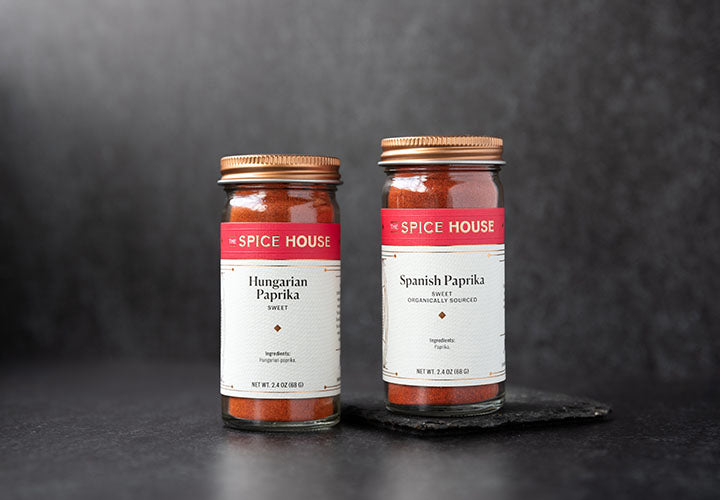09.23.2020
Spice Spotlight: Paprika

Paprika is as delicious as it is vibrant. The spice expresses sweet, earthy, smoky, slightly bitter, and fiery flavors. Too often we find ourselves reaching for paprika as a splash of color for deviled eggs. Many of our spice merchants will admit they used to do the same before working at The Spice House. Key words: Used to.
What is Paprika?
Paprika is a red-orange spice made from dried chile peppers of the species Capsicum annuum. There are five major species of chile peppers, and the annuum species is home to sweet bell peppers, paprika peppers, jalapeños, and cayenne. Paprika mimics those other chiles with its sweet, savory, and hot flavors. Out of the hundreds of paprikas on the market, we have selected five premium varieties for their quality, freshness, and flavor.
Paprika should be bought fresh and often. Store it in a cool, dry place away from light. Exposure to light will fade its color and weaken the flavor. The intense reddish hue in paprika is due to the high presence of carotene, just like a carrot. Paprika also contains more vitamin C per weight than oranges do.
Hot Paprika vs. Sweet Paprika
In the spice business, when we call a spice sweet, we mean it is not hot in flavor—Like sweet curry powder versus hot curry powder. Sweet paprikas are made when the pepper’s inner seed veins are removed before they are ground. Those veins are where the capsaicin is stored, the natural chemical responsible for all chile peppers’ heat.
Hungarian Paprika vs. Spanish Paprika

Hungarian paprika peppers are often long and pointy, like a guajillo chile pepper. When the peppers are ripe, they are picked from the field, beautifully strung up in garlands, and cured in barns for weeks before a final dry in the sun. The word, "paprika," is Hungarian for pepper. Their cuisine is rich with the spice and you will find it in place of black peppercorns at the table. Paprika is often the first thing in the frying pan alongside chopped onion, oil, or butter. If you want to make delicious Goulash recipe, or “Gulyás” you need some good Hungarian paprika. We offer both Hunagrian sweet paprika and half-sharp paprika—a medium-hot variety.
Hungarians also have the most complex grading system for paprika. They recognize eight different grades ranging from Noble sweet (Édesnemes) to Strong (erős). Today, most American spice importers rely on the American Spice Trade Association’s grading system. The American system bases grades on color, whereas the detailed Hungarian system judges by flavor and smell. We select our paprikas strictly for their flavor and aroma.
In Spain, paprika is called pimentón. Spanish paprika peppers are commonly stout and bell-shaped. Instead of drying in the sun, the majority of Spanish paprika is cured with woodsmoke. The best Spanish paprika comes from the La Vera region, 100 miles west of Madrid. In La Vera, they famously cure their peppers slowly over smoldering oak logs. The smoky fire sits on the first floor of a barn, while the peppers are laid on a second smoking floor to dry. You’ll notice our labels say, “Pimentón de la Vera Picante,” or, “Dulce.” This is Spanish for, “sweet or hot pepper from La Vera.” Spain has three grades of paprika; sweet/mild (pimentón dulce), medium heat (pimentón agridulce), and hot (pimentón picante). We offer both Spanish smoked sweet (dulce) paprika and smoked hot (picante) paprika.
In both countries, paprika is ground at mills close to where it is cultivated. Experienced millers will grind and carefully blend harvests from different farms across the region to ensure a consistent product each year. Similar to how Scottish whisky distillers balance spirits from various aging barrels, a paprika miller will balance color, heat, and flavor when crafting the final blend.
How to Cook with Paprika
Fresh paprika adds a savory richness to sauces, soups, homemade sausages, barbecue rubs, marinades, casseroles, and rice dishes. Gently heating (or blooming) the paprika in oil releases its flavors, a practice well-known in Hungary. Fry the paprika in olive oil, lard, or butter before adding other ingredients like onions, mushrooms, and garlic. Be careful not to overcook or burn the paprika. Too much heat will turn the spice bitter and overpower the dish.
Another great way to enjoy a smoky paprika is to sprinkle it over homemade French fries. Toss the fries in salt and a heavy sprinkle of paprika while they are hot, right out of the oil.
Common spices and herbs to pair with paprika are garlic, onion, saffron, ginger, allspice, turmeric, caraway, cumin, black pepper, oregano, marjoram, parsley, rosemary, and basil.
Other good ingredients to use with paprika are fresh mushrooms, onions, peppers, celery, carrots, eggplant, potatoes, noodles, dumplings, rice, olive oil, lemon juice, duck, chicken, eggs, lamb, pork, veal, sausage, yogurt, cheese, and sour cream.
If you have questions about paprika, or have a recipe to share, email us at spices@spicehouse.com or leave a comment below.
Top Recipes for Paprika
Traditional Hungarian Gulyásleves
Dry Spice Rub for Pork & Salmon
Chasity's Chicken Paprikash

Cabbage Rolls for Company
Creamy Cauliflower Soup
Spicy Beef Stroganoff
Spanish Rice






